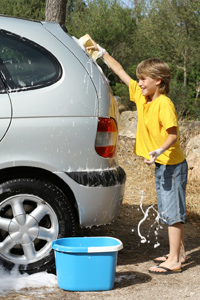How can I Keep my Children Active?
Exercise is vital for good physical, mental and emotional health. To keep your children active, give them opportunities to complete daily physical activity and lead by example - let them see you being active, too
 Parents who aspire for their children's success should remember that while academic achievement is crucial, physical exercise is equally important. A healthy body contributes to a healthy mind, and exercise plays a vital role in ensuring good physical, mental, and emotional health. All of these aspects are vital for a child's success in both learning and life. So, how can you keep your children active? This guide delves into the significance of exercise, provides tips on getting and keeping children active, and shows how to make it an enjoyable family activity.
Parents who aspire for their children's success should remember that while academic achievement is crucial, physical exercise is equally important. A healthy body contributes to a healthy mind, and exercise plays a vital role in ensuring good physical, mental, and emotional health. All of these aspects are vital for a child's success in both learning and life. So, how can you keep your children active? This guide delves into the significance of exercise, provides tips on getting and keeping children active, and shows how to make it an enjoyable family activity.
LEARN ABOUT THE BENEFITS OF LEARNING THROUGH QUIZZES
The Link Between Exercise and Learning
Exercise promotes blood circulation throughout the body, delivering oxygen to essential organs such as the heart and brain. Therefore, in addition to studying and homework, ensure that your child gets ample exercise as it contributes to their learning.
How Many Children Get Sufficient Exercise?
Statistics reveal that only 1 in 20 individuals meet the recommended weekly exercise guidelines. The earlier children adopt a healthy, active lifestyle, the better it is for their long-term health and well-being. Parents can play a crucial role in incorporating physical activity into their children's daily lives from a young age.
The Importance of Physical Activity
Research from the 'National Child Measurement Programme' in 2014/15 concluded that nearly 20% of 10-11 year-olds are classified as obese (Public Health England). The growing popularity of smartphones, the internet, video games, and other screen-based activities has led to children spending more time in sedentary behaviours. Parents can reverse this trend.
Exercise is essential for developing children's bones, joints, and muscles, in addition to fostering happiness and building confidence. Physical activity triggers a 'feel-good factor,' alleviates anxiety, and contributes to overall well-being. While your child may be initially reluctant, the fresh air and the release of 'feel-good' hormones like serotonin and endorphins will make exercise enjoyable.
Regular exercise also plays a role in preventing serious health issues like diabetes, heart disease, strokes, and hypertension. The British Heart Foundation website offers valuable information.
Youthful energy is abundant, and an hour of outdoor play or activity in the park can lead to a good night's sleep, which is crucial for their development. Physical activities with other children enable them to hone their social and teamwork skills.
Recommended Exercise Levels for Children
The government advises that children under the age of 5 should engage in around 3 hours of physical activity daily. For children aged 5-16, a minimum of 1 hour of exercise daily is recommended. Exercise doesn't have to occur all at once; it can be split into multiple sessions throughout the day.
Sports and Activities to Explore
Sports offer an enjoyable and competitive way to get children active. Encourage them to participate in local classes, clubs, or teams. Give them opportunities to explore a variety of sports and activities, including:
- Football
- Hockey
- Rugby
- Netball
- Tennis
- Basketball
- Volleyball
- Badminton
- Squash
- Swimming
- Surfing
- Water Polo
- Dancing
- Gymnastics
- Trampoline
- Athletics
- Martial Arts (Judo, Karate)
- Cycling
- Hiking
- Climbing
- Yoga
- Tai Chi
Engage the whole family in activities such as ice skating, rollerblading, bowling, or swimming at the local leisure centre. Exercise doesn't have to be costly - gather everyone for a relaxing countryside stroll or a family bike ride.
FIND OUT WHY KIDS LOVE OUR WEBSITE
Making Exercise Enjoyable for Children
Exercise should be enjoyable for children. It doesn't have to be intense; even walking counts as long as they are not sedentary. Here are some ideas to make exercise fun for children:
- Provide outdoor equipment like footballs, skipping ropes, Frisbees, water guns, and hula hoops for hours of fun!
- Engage in chasing games in the playground or garden.
- Spend an afternoon at the local park playing on slides, swings, and climbing frames.
- Take a day at the seaside for running on the beach, building sandcastles, or flying kites.
- Explore active holidays, such as camping, mountain climbing, water sports, abseiling, and cycling.
- Choose walking or cycling and explore the 'Walking Bus' scheme provided by the school.
Consider creating a 'Getting Active' schedule with different daily activities.
For more advice, visit the NHS website.
Encouraging Exercise for Children Who Dislike It

In a survey of 260,000 children, nearly 3⁄4 did not meet the recommended 1 hour of daily exercise. Some children might not enjoy traditional sports, so find activities they like and introduce exercise without them realizing it. Exercise doesn't necessarily require leaving home - involving children in gardening, chores, car washing, or dog walking all contribute to physical activity. Here are more ideas to get your children active:
- Encourage family and friends to participate, making it more engaging for your children.
- Offer positive praise, support, and let them know you are proud of their efforts.
- Statistics from 'Childwise' indicate that children aged 5-16 spent almost 7 hours a day using screens in 2016, so limit screen time, including computers, mobile phones, TV, and video games.
- Divide exercise into shorter sessions throughout the day to prevent it from feeling overwhelming.
- Set achievable exercise goals and gently increase their activity level. For example, consider participating in a sponsored 5km charity walk.
So, how can you keep your children active? No matter what activities you choose, ensure they have opportunities for daily physical activity. By doing so, you are fostering their long-term health and happiness. Lead by example by being physically active yourself!
For more parenting advice, check out the EQ Knowledge Bank. It's a valuable resource filled with articles addressing parents' questions about education, schooling, and, most importantly, raising happy and safe children. It's well worth exploring.



